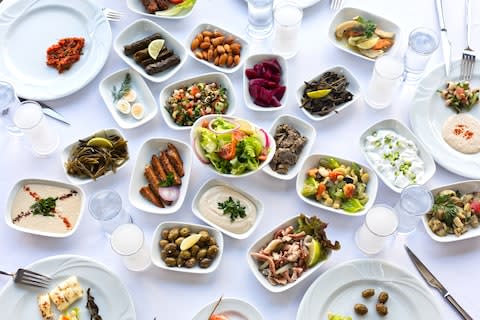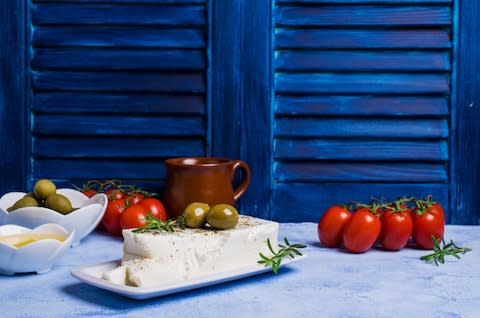The secret etiquette of the Greek taverna

The Greeks have an appetite for life that includes a seemingly insatiable passion for eating out. Perhaps that’s why there are so many different words for restaurant in Greek.
The most formal is the “estiatorio”, where you can expect a proper tablecloth and perhaps even surly waiters in white jackets. At the other end of the spectrum is the “bakalotaverna” – a grocery store packed to the painted rafters with tinned tomatoes and washing powder, where the owner cooks up a couple of dishes every day, served at a handful of tables covered in gaudily patterned oilcloth.
Then there’s the no-frills “magirio”, a kind of worker’s canteen, where you can peer into the battered pots in the kitchen and pick out a choice piece of braised lamb or the plumpest stuffed tomato. The “koutouki” is a cosy neighbourhood joint, usually in a smoky basement lined with wine barrels.
For a cheap midweek meal, Greeks often head to the “psistaria”, specialising in hunks of char-grilled meat, from souvlaki to “kokoretsi”, a hard-core carnivore’s delight of liver, stomach, and sweetbreads wrapped in intestines and slow-roast on a rotisserie. For a leisurely drinking session accompanied by endless sharing plates, they go to an “ouzeri”.
The classic Greek dining experience is, of course, the “taverna”. Whether the tables are wedged into the sand or tucked away in a vine-shaded courtyard, the recipe for success is pretty standard: family-run and family-friendly, these informal restaurants serve an array of Greek meze, followed by grilled meat or fish. The chef might have a special dish or two – nettle pie, or octopus stewed with shallots – but the menu never veers too far from the traditional. And that’s just the way the regulars like it.
You can’t really go wrong eating at a taverna (unless it is one of the tourist traps in Plaka, the old town of Athens). But despite the casual, welcoming atmosphere, there’s a certain etiquette to experiencing the taverna like a local.

Don’t show up too early
Greeks eat late – anywhere between 2pm and 4pm for lunch, and never before 9pm for dinner. Most taverna kitchens stay open until midnight. It’s perfectly acceptable to rock up an hour after your appointed date and to spin out a meal over several hours.
Table for one? It’s not done
Greeks rarely eat alone. Taverna meals are sociable occasions where friends and extended family noisily share food and gossip. Sex and politics are perfectly acceptable topics of conversation. As the ancient Greek philosopher Epicurus said: “We should look for someone to eat and drink with before looking for something to eat and drink, for dining alone is leading the life of a lion or wolf”. If you do show up to a taverna solo, don’t be surprised if strangers offer you some wine or invite you to join their party.
You can never over-order
Never order a starter, main course, and dessert for yourself. When it comes to ordering, everyone just shouts out what they fancy to the waiter. Starters are then slapped in the middle of the table, so everyone can dig in. Some places bring out a heaving tray of mezze, so you can see what you’re ordering (handy if you don’t speak Greek). Over-enthusiastic ordering of meze doesn’t leave much room for a main course, so those are usually shared, too.
Leave your gluten-free diet at home
The first thing to arrive on your table will be a basket heaped with bread. Its main purpose is the “papara” – a crust of bread dunked into the tomato juice and olive oil at the bottom of a Greek salad, a sticky dish of baked aubergines, or the egg and lemon sauce drizzled over stuffed cabbage leaves. The quality of both the bread and the oil are the true hallmark of a great taverna.
Don’t be a stickler for formality
Don’t expect five-star service; your waiter is probably the owner’s nephew. Forget starched tablecloths; instead, you get a handy map of whichever island you’re on, printed on greaseproof paper. Wine comes in tin jugs, not bottles. Round after round of mezze arrive in random order. Never mind if your chips arrive half an hour after your main course; they’ll be crisp and irresistible, the perfect excuse to order another carafe of wine. Your plates won’t be cleared away. Dessert — a wedge of watermelon or some yoghurt with home-made cherry preserve, on the house — might be plonked on top of a pile of gnawed lamb chops.
Don’t forget the feta
It goes with everything.

Expect a side of smoke with your supper
Smoking is officially banned in Greek restaurants. That doesn’t seem to deter anyone. Thankfully, you can sit outside for most of the year.
Don’t get out your calculator
Taverna culture is all about generosity – an abundance of huge portions, complimentary dessert, and finally a heated argument about who gets to pay the bill. This is a point of honour among Greeks, so if you want to pay, sneak into the kitchen when nobody is looking. And tip handsomely. Greek waiters are not well paid.
Four of the best tavernas in Greece
Tholos, Symi
The setting — tables teetering on the waterfront of Symi’s postcard-pretty harbour — is as captivating as the delicate food at this fish taverna. Order taramasalata, flash-fried baby shrimp, and a “monk’s salad” of lentils, bulgar, caper leaves, and caramelised onions.
Symi harbour; +30 22460 72033
O Mavros Gatos, Athens
The aroma of sizzling lamb chops wafts through the backstreet on which this neighbourhood favourite is located. All chequered tablecloths and easy-going cheer, this is the place for Greek comfort food: beef in lemon sauce, pastitsio, courgette, feta, and leek pie.
Polemonos 4, Pangrati, Athens; +30 210 723 6903

O Prekas, Amorgos
It takes anywhere between seven and ten hours to get from Athens to the deliciously remote Cycladic island of Amorgos. But you can step right off the ferry boat into this time-warp travel agent-cum-taverna, where the fish comes fresh off the colourful boats moored nearby.
Katapola, Amorgos; +30 22850 71256
Evgonia, Crete
Hidden in the backstreets of Chania, you have to make an effort to find this taverna. The reward? Some of the best food anywhere on Crete, an island famed for its culinary scene. The owner Nektarios, a former taxi driver, and his wife, Eva, produce consistently great dishes, including rice with chickpeas, marinated anchovies, and grilled cod.
Milonogianni120, Chania, Crete; +30 28210 59420

